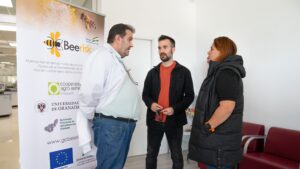A PCR for bees: Researchers in Spain are working on a system for the rapid detection of diseases in beehives
Published Dec 3, 2024
Tridge summary
The Beerisk operative group, a collaboration between the University of Granada, Apinevada, DOP “Miel de Granada”, Beekeepers of Granada, and Agro-Food Cooperatives of Granada (Faeca), is developing a rapid diagnostic kit to identify the main pathogens of honey bees. The kit will be used by beekeepers and veterinarians to detect diseases in hives and assess the risk of transmission between apiaries. The project aims to combat the decline in the bee population due to habitat loss, climate change, pesticides, parasites, and diseases, and to develop new strategies for early disease detection. The group will also keep the beekeeping community informed of the project results and action plans for containing diseases in apiaries.
Disclaimer:The above summary was generated by Tridge's proprietary AI model for informational purposes.
Original content
The Beerisk operative group works with honey bees from Lanjarón with the aim of generating a diagnostic kit so that beekeepers and veterinarians can identify the main pathogens of these insects and detect diseases in hives. Beerisk is the name of an operative group that works with the aim of developing new molecular tools for the rapid monitoring of honey bee diseases in apiaries in the province of Granada.  Representatives of the operational group formed by researchers from Biochemistry and Molecular Parasitology of the University of Granada, Apinevada, DOP “Miel de Granada”, Beekeepers of Granada and Agro-Food Cooperatives of Granada (Faeca), have met at the Honey Museum, in Lanjarón, to update the progress being made in this project, which ...
Representatives of the operational group formed by researchers from Biochemistry and Molecular Parasitology of the University of Granada, Apinevada, DOP “Miel de Granada”, Beekeepers of Granada and Agro-Food Cooperatives of Granada (Faeca), have met at the Honey Museum, in Lanjarón, to update the progress being made in this project, which ...
 Representatives of the operational group formed by researchers from Biochemistry and Molecular Parasitology of the University of Granada, Apinevada, DOP “Miel de Granada”, Beekeepers of Granada and Agro-Food Cooperatives of Granada (Faeca), have met at the Honey Museum, in Lanjarón, to update the progress being made in this project, which ...
Representatives of the operational group formed by researchers from Biochemistry and Molecular Parasitology of the University of Granada, Apinevada, DOP “Miel de Granada”, Beekeepers of Granada and Agro-Food Cooperatives of Granada (Faeca), have met at the Honey Museum, in Lanjarón, to update the progress being made in this project, which ...Source: Agroinformacion
Would you like more in-depth insights?
Gain access to detailed market analysis tailored to your business needs.
What to read next
Read more relevant content
By clicking “Accept Cookies,” I agree to provide cookies for statistical and personalized preference purposes. To learn more about our cookies, please read our Privacy Policy.

